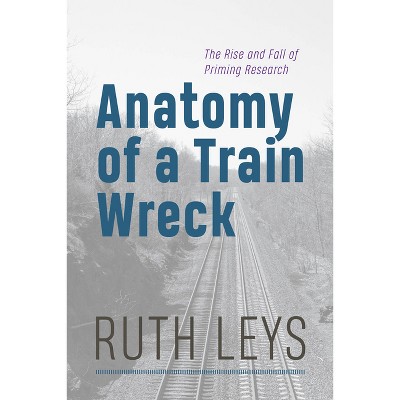Sponsored

Anatomy of a Train Wreck - by Ruth Leys
$115.00
In Stock
Eligible for registries and wish lists
Sponsored
About this item
Highlights
- A history of "priming" research that analyzes the field's underlying assumptions and experimental protocols to shed new light on a contemporary crisis in social psychology.
- About the Author: Ruth Leys is professor emerita of the humanities at Johns Hopkins University.
- 416 Pages
- Psychology, Research & Methodology
Description
About the Book
"In 2012 a team of Belgian scientists reported that they had been unable to replicate an iconic psychology experiment in the field known as priming. The original experiment purported to show the influence of stimuli on the behavior of experimental subjects, specifically their automatic tendency to walk more slowly when they were "primed" by words connoting old age. The failed replication contributed to an emerging debate over what had gone wrong in psychology, as many other well-known priming and related experiments also soon proved to be unreplicable. According to Ruth Leys, the effect was to help precipitate a devastating reckoning from which not only the priming field but the psychological and cognitive sciences more generally have yet to recover. Understandably, the huge and bitter controversy has largely focused on methodological problems in the psychological sciences and on the steps needed to reform the field. But important as this literature on the failings of psychology has been, Leys argues that there has been no attempt so far to analyze the history of the scientific hypotheses and experimental practices that from the start have guided and motivated priming research itself. In other words, we lack what Leys calls a genealogy of the theoretical assumptions and scientific paradigms informing the research on priming and automatic behavior, and which can be seen to have led to the crisis of 2012. This is what her book provides"--Book Synopsis
A history of "priming" research that analyzes the field's underlying assumptions and experimental protocols to shed new light on a contemporary crisis in social psychology. In 2012, a team of Belgian scientists reported that they had been unable to replicate a canonical experiment in the field of psychology known as "priming." The original experiment, performed by John Bargh in the nineties, had purported to show that words connoting old age unconsciously influenced--or primed--research subjects, causing them to walk more slowly. When subsequent researchers could not replicate these results, Nobel-winning psychologist Daniel Kahneman warned of a "train wreck looming" if Bargh and his colleagues could not address doubts about their work. Since then, the inability to replicate other well-known priming experiments has helped precipitate an ongoing debate over what has gone wrong in psychology, raising fundamental questions about the soundness of research practices in the field. Anatomy of a Train Wreck offers the first detailed history of priming research from its origins in the early 1980s to its recent collapse. Ruth Leys places priming experiments in the context of contemporaneous debates over not only the nature of automaticity but also the very foundations of social psychology. While these latest discussions about priming have largely focused on methodology--including sloppy experimental practices, inadequate statistical methods, and publication bias--Leys offers a genealogy of the theoretical expectations and scientific paradigms that have guided and motivated priming research itself. Examining scientists' intellectual strategies, their responses to criticism, and their assumptions about the nature of subjectivity, Anatomy of a Train Wreck raises crucial questions about the evidence surrounding unconscious influence and probes the larger stakes of the replication crisis: psychology's status as a science.Review Quotes
"Packed with compelling research, [Leys'] engaging account will be of interest to anyone curious about psychology and influences on human behavior."-- "Nature"
"This detailed overview of the history, controversies, conflicts, and present status of a key recent area of research in social psychology meticulously traces the arguments regarding the methodological basis and theoretical focus of priming research. . . . Leys is not an experimental psychologist but a philosophical historian, who, in very clear writing, makes a straightforward case for psychology as a science. Highly recommended for those who wish to trace this controversy through the key published arguments." -- "Choice"
"A subtle . . . polemic against [a] two-dimensional conception of the human mind, as well as an argument for moving social psychology out of the laboratory and into the street. . . . One of the great surprises of Anatomy of a Train Wreck is the gulf between the vast inferences about human nature that researchers make and the very modest experiments that sustain them." -- "Chronicle of Higher Education"
"As Leys shows in Anatomy of a Train Wreck--her engrossing, deeply researched, and meticulously argued account of priming's fate--the empire of priming came crashing down in the course of psychology's replication crisis, a crisis that has since swept through the sciences more generally. . . . Leys's granular reconstruction of priming's rise and fall makes the high stakes involved abundantly clear."-- "Science"
"Leys is the sharpest interpreter of the neurosciences working in the humanities today. Her Anatomy of a Train Wreck contributes to a buzzing scholarship in critical neuroscience that spans the disciplines of history of science and science studies, anthropology, philosophy, and critical psychology. What makes her work stand out is that it is never solely focused on a critique of the neurosciences. Rather, Leys writes her critique with a firm grounding in the history and theory of psychoanalysis, which not only makes sense for her historical framing but gives nuance and vision to her arguments. In Anatomy of a Train Wreck, Leys deploys Freud's notion of the unconscious--used in skewed and partial ways by the historical actors--to sketch a richer view of intentionality, pointing the way to an epistemology that can capture the complexity of human behavior."--Katja Guenther, Princeton University
"Leys provides a thrilling intellectual history of the rise and fall of research on the automaticity of everyday behavior and exposes how highly acclaimed science went astray. The idea that individual agency is an illusion, documented by priming effects and propagated in the media worldwide, turned out to be an illusion itself. A meticulously researched, critical, and eye-opening book."--Gerd Gigerenzer, Max Planck Institute for Human Development
About the Author
Ruth Leys is professor emerita of the humanities at Johns Hopkins University. She is the author of Trauma: A Genealogy, From Guilt to Shame: Auschwitz and After, The Ascent of Affect: Genealogy and Critique, and Newborn Imitation: The Stakes of a Controversy.Dimensions (Overall): 9.0 Inches (H) x 6.0 Inches (W) x 1.06 Inches (D)
Weight: 1.72 Pounds
Suggested Age: 22 Years and Up
Number of Pages: 416
Genre: Psychology
Sub-Genre: Research & Methodology
Publisher: University of Chicago Press
Format: Hardcover
Author: Ruth Leys
Language: English
Street Date: December 5, 2024
TCIN: 1006101460
UPC: 9780226836935
Item Number (DPCI): 247-50-2206
Origin: Made in the USA or Imported
If the item details aren’t accurate or complete, we want to know about it.
Shipping details
Estimated ship dimensions: 1.06 inches length x 6 inches width x 9 inches height
Estimated ship weight: 1.72 pounds
We regret that this item cannot be shipped to PO Boxes.
This item cannot be shipped to the following locations: American Samoa (see also separate entry under AS), Guam (see also separate entry under GU), Northern Mariana Islands, Puerto Rico (see also separate entry under PR), United States Minor Outlying Islands, Virgin Islands, U.S., APO/FPO
Return details
This item can be returned to any Target store or Target.com.
This item must be returned within 90 days of the date it was purchased in store, shipped, delivered by a Shipt shopper, or made ready for pickup.
See the return policy for complete information.





